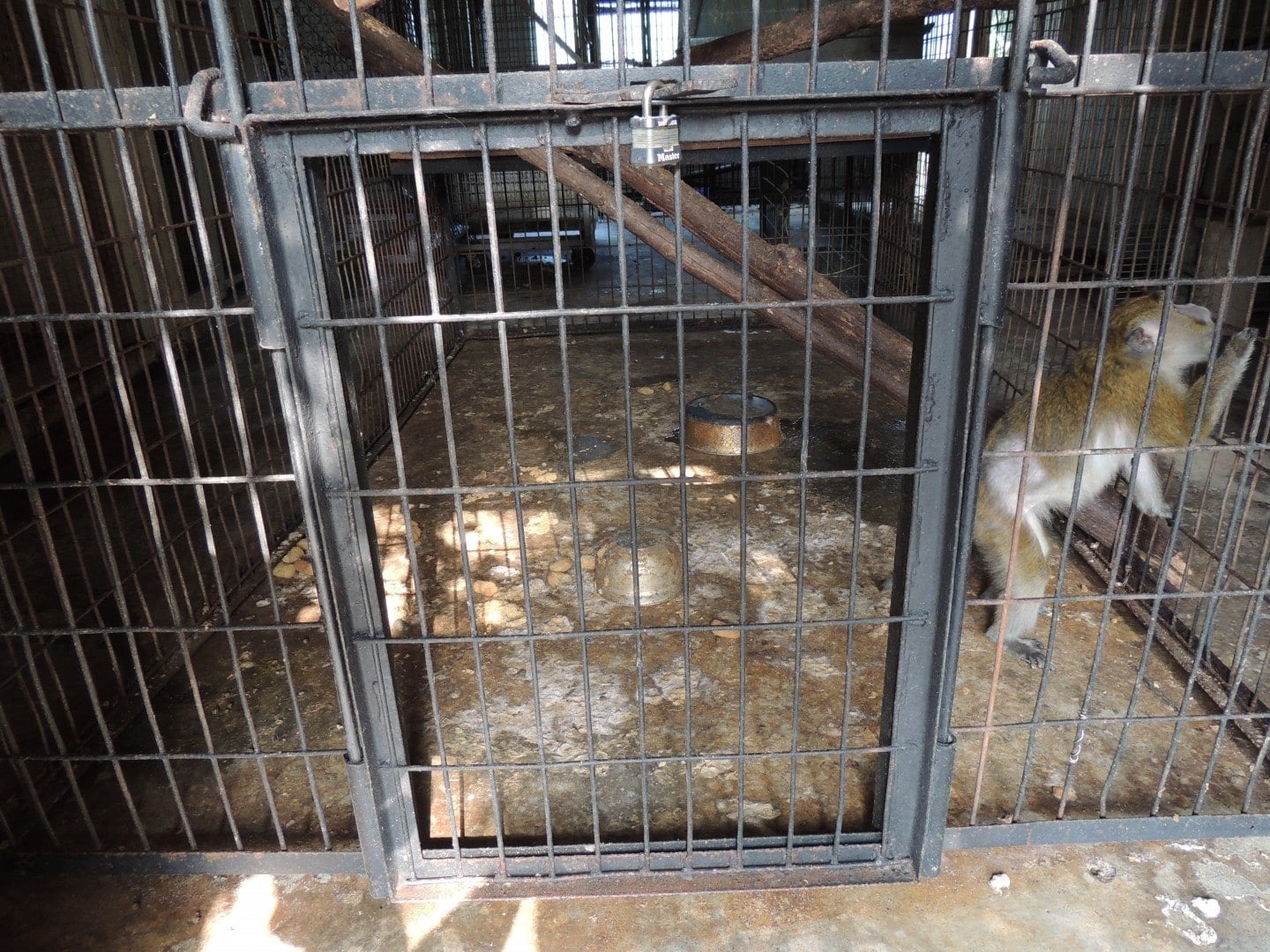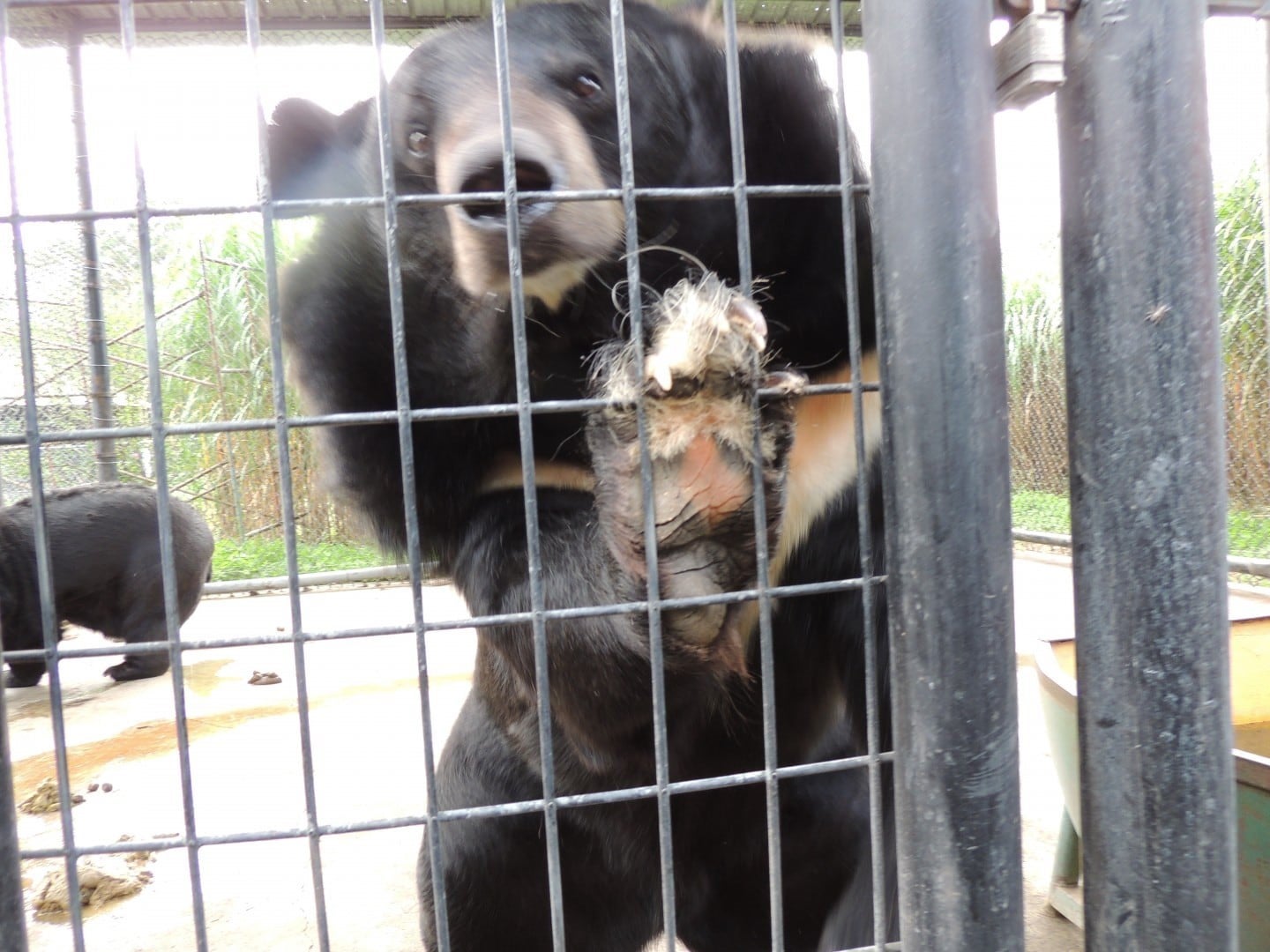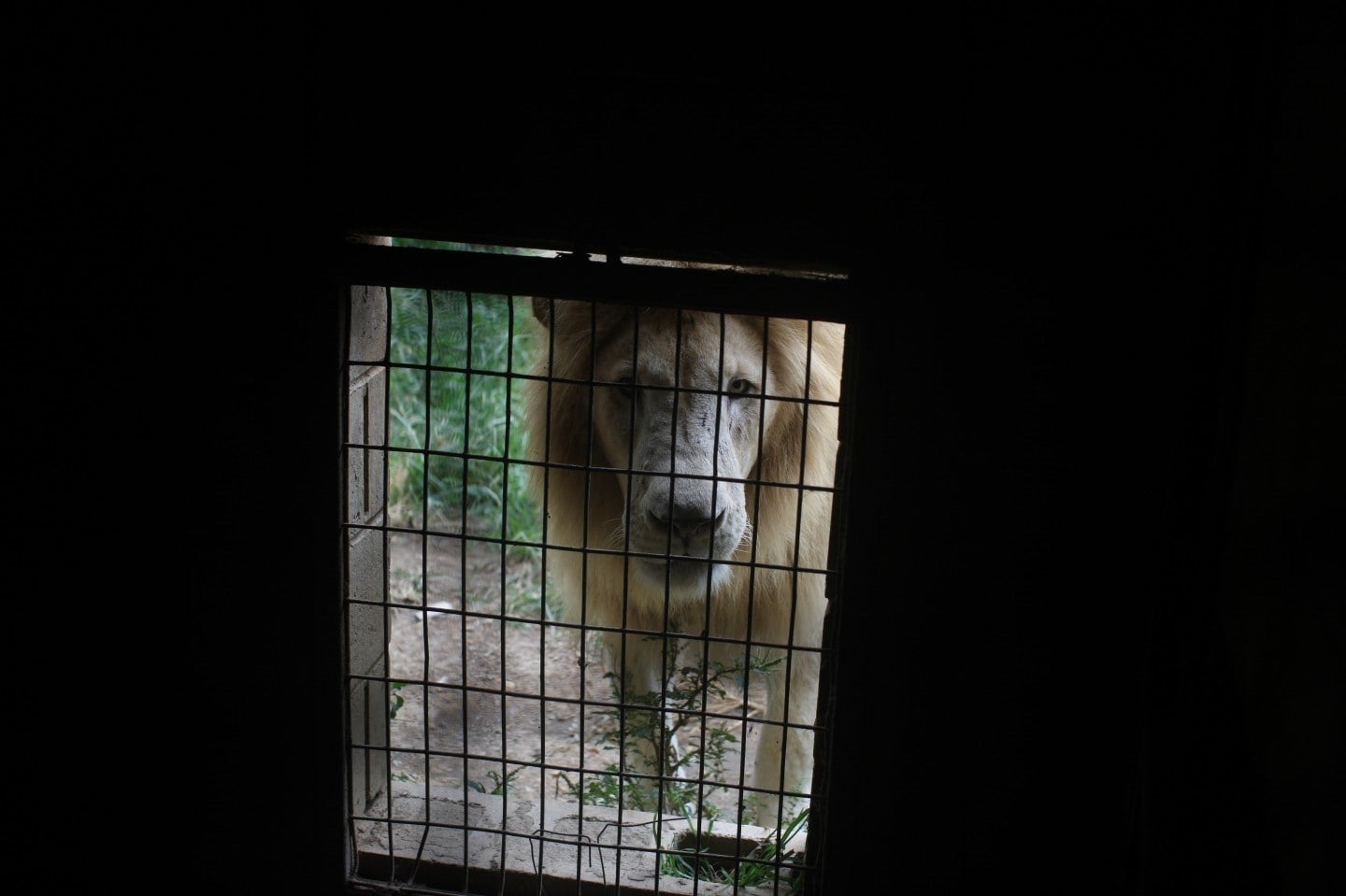‘Monkey dungeon’ discovered in US zoo
Dead lemur also found in freezer, court hears

When an animal welfare inspector from the US Department of Agriculture (USDA) visited Wilson’s Wild Animal Park this summer, she identified no violations.
The federal inspection report for the zoo in Virginia, which is home to about 200 exotic and barnyard animals, was pristine.
But that is not what local law-enforcement officers found the very next day.
Sent by the state attorney general, their observations triggered a search one week later by a team of veterinarians, zoologists and law enforcement officers.
They discovered an array of problems, according to later court testimony, including a pony with a swollen face, maggot-covered meat in the tiger cage, and what a prosecutor described as a “monkey dungeon”.
The search team seized 119 animals whose lives they deemed to be in danger.
Last month, the zoo's owner, Keith Wilson, and an employee were each charged under Virginia law with 46 counts of animal cruelty.
The chasm between the USDA and local assessments provides a stark illustration of a dramatic decline in federal animal-welfare enforcement amid a deregulation push by the Trump administration.
From 2016 to 2018, the number of USDA citations issued to about 10,000 zoos, circuses, breeders and research labs under its regulation fell by 65 per cent.
The agency attributes the drop in citations, which can lead to fines and revoked licences, to new efforts to work closely with businesses and their veterinarians to correct violations. Former employees have said it is the result of a more lenient approach that puts animals at risk.
The Virginia zoo was among the facilities that the USDA stopped citing. For years, inspectors documented numerous violations there, including a lion enclosure with walls too short to prevent escape and a concrete-floored bear pen with little more than a tire-swing for entertainment.
Since mid-2018, however, the zoo’s three reports have been clean.

Mark Patterson, CEO of the Cavalry Group, an organisation that advocates for animal businesses and is representing Mr Wilson, said the Virginia charges are “false, unfounded and capricious”.
He claimed that the state had sent “unqualified experts” to the zoo and denied Mr Wilson due process in order “to literally steal private property”. He said Mr Wilson had fixed the problems cited during previous USDA inspections.
In rare cases, local authorities are pursuing cases against animal owners whose USDA inspections reflect few, if any, problems.
Eric Schmitt, the Missouri attorney general, sued a dog breeder in October after state inspectors repeatedly found over the previous year what Mr Schmitt called “horrible and inexcusable” conditions at her operation, including filthy cages and bony dogs.
The breeder was given one citation by the USDA over that same period, according to records obtained by the Humane Society of the United States.
“The Trump administration has a long record of pulling back on science and enforcement of laws and regulations in a lot of different areas, and it is important for states, and I think it’s important for me as Virginia’s attorney general, to step up,” Mark Herring, the Virginia attorney general whose animal law unit is prosecuting Mr Wilson, said in an interview.
“Where I’m able to use Virginia law to fill the void that is left by the Trump administration backing off from science and enforcement, I’m going to do it.”
Animal protection groups say these cases are exceptions. however. They say that local authorities more often point to clean USDA inspections as reasons not to pursue charges under local laws.
Bob Baker, executive director of the Missouri Alliance for Animal Legislation, said he has been “told repeatedly” by officials in the state, which is home to hundreds of commercial breeders, that they worried prosecutions could fail if accused violators submitted USDA inspections in court.
“It’s to the point where I believe that it’s interfered with our state taking legal action against some of these bad breeders,” Mr Baker said.
In Virginia, People for the Ethical Treatment of Animals (Peta) pushed authorities to investigate Wilson’s operation for three years before Mr Herring’s office took it on, said Brittany Peet, a Peta Foundation attorney.
She said: “We’re still constantly running up against state and local law-enforcement authorities [elsewhere] deferring to the USDA and refusing to take action because of clean USDA reports.”
Those clean reports have become far more common since Donald Trump took office in 2016. Former USDA inspectors and supervisors have told The Washington Post that they were instructed to focus on education over enforcement, to record problems as “teachable moments” instead of violations, and to not document violations that are self-reported by those they inspect.
Members of congress have criticised these changes, and a bipartisan spending bill expected to pass this week will require the USDA to publish online all records of violations.
Lyndsay Cole, a spokeswoman for the USDA’s Animal and Plant Health Inspection Service, said the inspector had found “some issues among some of the animals” at Wilson’s Wild Animal Park on 7 August, but did not write them up because Mr Wilson had demonstrated that he was working with his veterinarian to resolve them.
Critics say that lack of documentation protects violators. The changes “have essentially negated public confidence in a ‘clean’ inspection report”, said William Stokes, a veterinarian who oversaw inspectors as an assistant director in the USDA’s animal care unit from 2014 to 2018.
“While other federal, state, and local agencies previously could rely on the USDA inspection reports, their value is now questionable,” he said.
At a county hearing in August over custody of the animals seized from the zoo, Wilson’s lawyer sought several times to submit as evidence his client’s USDA inspection reports, calling them “critical to providing the balance” with local authorities’ findings.
Prosecutor Michelle Welch argued that the USDA reports were irrelevant to a case involving state laws, and the judge did not allow them.
What the judge did weigh was 12 hours of testimony, mostly about what the search team found at Wilson’s on 15 August.
The zoo, which opened in Winchester in 1976, sits on a two-lane road near private homes and a Montessori school. As many as 200 visitors a day paid $9 to view its collection of animals, Mr Wilson testified.
Three veterinarians who examined animals during the search said they were surprised by the number they believed faced a “direct and immediate threat” to their lives due to a lack of water, food, shelter or medical attention.
“I didn’t think the conditions were going to be that poor,” testified Samantha Moffitt, a Virginia emergency veterinarian.
Ernesto Dominguez, a veterinarian at the Wildlife Centre of Virginia, told the court about a spider monkey with a “big mass” on its stomach and a wasp nest in its enclosure.
Darren Minier, assistant director of animal care at California‘s Oakland Zoo, testified that he found faeces, urine and algae in the bears’ water. In one corner of a stuffy building holding lemurs and monkeys was “a huge pile of faeces and old food”, testified Mindy Babitz, an animal keeper at Smithsonian’s National Zoo.
And in a freezer in the gift shop, the search team found a dead lemur and a dead cat.
“The monkeys are in a monkey dungeon, judge, it stunk to high heaven,” Ms Welch said, adding that the team wanted to seize more than 119 animals but could not immediately find new homes for them. “We couldn’t even place them all. That’s how deplorable the conditions were.”
Mr Wilson testified that animals were given water multiple times a day, as well as ample food and shelter. Cleaning and watering routinely happened in the morning, he said, but did not on the day of the search because it began before the park opened.
Maggots on the meat could have sprouted overnight in the summer heat, he testified.
He said customers did not have access to the freezer holding dead animals, which he intended to bury.

Mr Wilson acknowledged that “mistakes happen”, when asked about a filthy trash can, but he said he had been working on expanding the bear and lion enclosures.
His veterinarian testified that he had never witnessed insufficient food, water or shelter for the animals when he visited – except in the case of a lamb he had determined was “starving” in July.
State animal-welfare laws are different from the federal regulations enforced by the USDA. In Virginia, Mr Wilson was charged under a criminal statute that applies to all species and requires “necessary food, drink, shelter or emergency veterinary treatment”.
The animal welfare regulations enforced by the USDA are administrative laws that do not apply to some species, including birds, 17 of which were seized at Wilson’s zoo.
Dog cages have precise space requirements, while big cat enclosures must simply allow “normal postural and social adjustments with adequate freedom of movement”.
Former USDA employees say inspectors, many of them veterinarians, previously had far more authority to use professional judgement when considering citations. In 2018, however, inspectors were told to follow regulations to the letter, former employees said. For example, they could no longer cite enclosures they judged to be inadequate without evidence that animals inside were malnourished, stressed, weak, in “poor condition” or behaving abnormally.
“Bears dig, they climb, they love to play in the water, so we would want them to do those things. But if they’re not showing some kind of distress or physical abnormality, it’s not citable anymore,” one former employee said. “I think that the strict interpretation, the absolutely black-letter law, is probably not good for the advancement of animal welfare.”
Mr Wilson’s representative said he expects that “all USDA evidence will be presented” at future hearings related to the case.
“How we treat our animals says something about who we are as a society,” Mr Herring said. “It’s really important to make sure that those who mistreat animals are held accountable.”
Mr Wilson and a zoo employee, Christian Dall’Acqua, each face up to 46 years in prison and $115,000 (£88,100) in fines. The Virginia attorney general’s office said the animals seized are now at sanctuaries.
These days, Wilson’s Wild Animal Park is quiet. On a gate pulled across its gravel driveway one recent afternoon, a handwritten sign had been hung: “CLOSED UNTIL FURTHER NOTICE.”
The Washington Post
Join our commenting forum
Join thought-provoking conversations, follow other Independent readers and see their replies
Comments